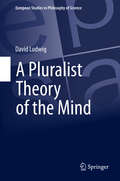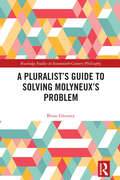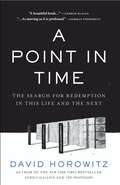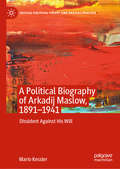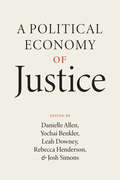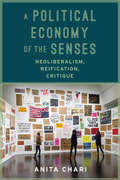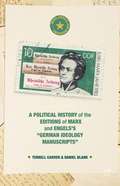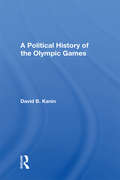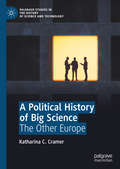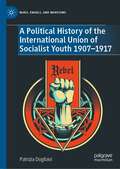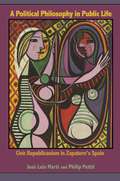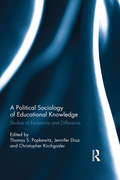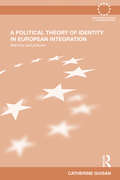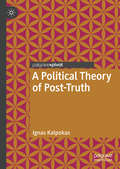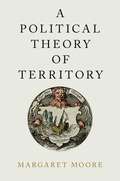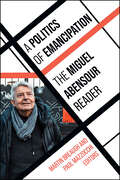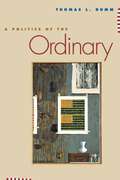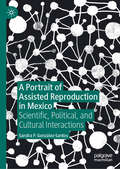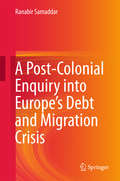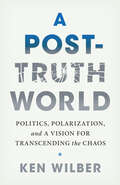- Table View
- List View
A Pluralist Theory of the Mind (European Studies in Philosophy of Science #2)
by David LudwigThis book challenges common debates in philosophy of mind by questioning the framework of placement problems in contemporary metaphysics. The author argues that placement problems arise when exactly one fundamental ontology serves as the base for all entities, and will propose a pluralist alternative that takes the diversity of our conceptual resources and ontologies seriously. This general pluralist account is applied to issues in philosophy of mind to argue that contemporary debates about the mind-body problem are built on this problematic framework of placement problems. The starting point is the plurality of ontologies in scientific practice. Not only can we describe the world in terms of physical, biological, or psychological ontologies, but any serious engagement with scientific ontologies will identify more specific ontologies in each domain. For example, there is not one unified ontology for biology, but rather a diversity of scientific specializations with different ontological needs. Based on this account of scientific practice the author argues that there is no reason to assume that ontological unification must be possible everywhere. Without this ideal, the scope of ontological unification turns out to be an open empirical question and there is no need to present unification failures as philosophically puzzling "placement problems".
A Pluralist’s Guide to Solving Molyneux’s Problem (Routledge Studies in Seventeenth-Century Philosophy)
by Brian GlenneyThis book presents a novel pluralist strategy for answering Molyneux’s 300+-year-old conundrum: Would a person, born blind but given sight, identify a shape previously known only by their touch? The author interweaves historical scholarship with contemporary philosophical work and empirical research on animal, infant, and adult human perception.The author argues that we need a new approach to Molyneux’s problem because we do not know what the problem is really about, and it is untestable because a Molyneux subject cannot be physically realized. He criticizes Molyneux’s question for its simplistic taxonomy of "the blind" that groups significant individual differences into a singular ontology. Research in the cognitive sciences confirms that various kinds of blindness can co-occur, such as ocular, cortical, and psychological blindness. Therefore, the author adopts an explanatory pluralism for answering Molyneux’s problem, which includes no, yes, and "no answer" answers according to the domain of inquiry being used. This account provides a research-based answer to a long-standing problem using previously unheeded insights particularly from animal crossmodal perception studies to retell a more complex story of perception: its levels of explanation and integration.A Pluralist’s Guide to Solving Molyneux’s Problem will be of interest to researchers and advanced students working in comparative psychology, epistemology, history of philosophy, philosophy of perception.
A Point in Time: The Search for Redemption in This Life and the Next
by David HorowitzA Matter of Life and DeathNew York Times bestselling author David Horowitz is famous for his conversion from 1960s radicalism. In A Point in Time, his lyrical yet startling new book, he offers meditations on an even deeper conversion, one which touches on the very essence of every human life.Part memoir and part philosophical reflection, A Point in Time focuses on man's inevitable search for meaning-and how for those without religious belief, that search often leads to a faith in historical progress, one that is bound to disappoint. Horowitz agrees with Marcus Aurelius, whose stoic philosophy provides a focal point for the book, "He who has seen present things has seen all, both everything that has taken place from all eternity and everything that will be for time without end...."Horowitz remembers his father, a political radical who put his faith in just such a redemptive future. He examines this hope through the other great figure who organizes these reflections, the Russian novelist Fyodor Dostoevsky, whose writings foreshadowed the great tragedies of the social revolutions to come. Horowitz draws on eternal themes: the need we have to make sense out of the lives we have been given, our desire to repair the injustices we encounter, and the consequences of our mortality.Interweaving episodes of his own life with the writings of the philosopher and the novelist, Horowitz explores how we provide meaning to an apparently senseless existence and the dire consequences that follow from seeking to redeem it by attempting to make a perfect world out of the imperfect one in which we find ourselves.Praise forA POINT IN TIME"David Horowitz is so powerful a polemicist that it is often forgotten how beautifully he writes. For the same reason, the deeply considered philosophical perspective and the wide-ranging erudition underlying his political passions are just as often overlooked. But it is precisely these qualities that come to the fore and shine through so brilliantly in the linked meditations that make up A Point in Time. With Marcus Aurelius, Ecclesiastes, and Dostoevsky as its guides, this little book boldly ventures into an exploration of first things and last that is as moving as it is profound."-NORMAN PODHORETZ, author of Why Are Jews Liberals?"A beautiful book, both sad and uplifting. Moving in turns from the intimate to the universal, Horowitz not only explores but also embodies the dignity of the tragic worldview. A Point in Time is a poignant and elegiac reflection on life from a man who bears the burden of unknowing with courage and grace."-ANDREW KLAVAN, author of True Crime and Empire of Lies"Emulating Marcus Aurelius, David Horowitz has produced a meditation on facing death that is poignant and wise. Whether invoking the Stoics or reflecting on his own father, he helps us think through that most basic of all questions: what is it that can give meaning to our existence?"-WALTER ISAACSON, author of Einstein"I have admired David Horowitz for decades. He has taught me many important lessons. But never have I been so moved by his writing as I am by this brief and profound book."-DENNIS PRAGER, author of Why the Jews?
A Political Biography of Arkadij Maslow, 1891-1941: Dissident Against His Will (Critical Political Theory and Radical Practice)
by Mario KesslerThis book is a political biography of Arkadij Maksimovich Maslow (1891-1941), a German Communist politician and later a dissident and opponent to Stalin. Together with his political and common-law marriage partner, Ruth Fischer, Maslow briefly led the Communist Party of Germany, the KPD, and brought about its submission to Moscow. Afterwards Fischer and Maslow were removed from the KPD leadership in the fall of 1925 and expelled from the party a year later. Henceforth they both lived as communist outsiders—persecuted by both Hitler and Stalin. Maslow escaped to Cuba via France and Portugal and was murdered under dubious circumstances in Havana in November 1941. He died as a communist dissident committed to the cause of a radical-socialist labor movement that lay in ruins. Kessler considers Maslow's role in pivotal events such as the Bolshevik Revolution, in Soviet revolutionary parties and organizations, through to the rise of Stalinism and Cold War anti-communism. What results is a deep dive into the life of a key yet understudied figure in dissident communism.
A Political Economy of Justice
by Leah DowneyDefining a just economy in a tenuous social-political time. If we can agree that our current social-political moment is tenuous and unsustainable—and indeed, that may be the only thing we can agree on right now—then how do markets, governments, and people interact in this next era of the world? A Political Economy of Justice considers the strained state of our political economy in terms of where it can go from here. The contributors to this timely and essential volume look squarely at how normative and positive questions about political economy interact with each other—and from that beginning, how to chart a way forward to a just economy. A Political Economy of Justice collects fourteen essays from prominent scholars across the social sciences, each writing in one of three lanes: the measures of a just political economy; the role of firms; and the roles of institutions and governments. The result is a wholly original and urgent new benchmark for the next stage of our democracy.
A Political Economy of Justice
by Leah DowneyDefining a just economy in a tenuous social-political time. If we can agree that our current social-political moment is tenuous and unsustainable—and indeed, that may be the only thing we can agree on right now—then how do markets, governments, and people interact in this next era of the world? A Political Economy of Justice considers the strained state of our political economy in terms of where it can go from here. The contributors to this timely and essential volume look squarely at how normative and positive questions about political economy interact with each other—and from that beginning, how to chart a way forward to a just economy. A Political Economy of Justice collects fourteen essays from prominent scholars across the social sciences, each writing in one of three lanes: the measures of a just political economy; the role of firms; and the roles of institutions and governments. The result is a wholly original and urgent new benchmark for the next stage of our democracy.
A Political Economy of Justice
by Leah DowneyDefining a just economy in a tenuous social-political time. If we can agree that our current social-political moment is tenuous and unsustainable—and indeed, that may be the only thing we can agree on right now—then how do markets, governments, and people interact in this next era of the world? A Political Economy of Justice considers the strained state of our political economy in terms of where it can go from here. The contributors to this timely and essential volume look squarely at how normative and positive questions about political economy interact with each other—and from that beginning, how to chart a way forward to a just economy. A Political Economy of Justice collects fourteen essays from prominent scholars across the social sciences, each writing in one of three lanes: the measures of a just political economy; the role of firms; and the roles of institutions and governments. The result is a wholly original and urgent new benchmark for the next stage of our democracy.
A Political Economy of the Senses: Neoliberalism, Reification, Critique (New Directions in Critical Theory #2)
by Anita ChariAnita Chari revives the concept of reification from Marx and the Frankfurt School to spotlight the resistance to neoliberal capitalism now forming at the level of political economy and at the more sensate, experiential level of subjective transformation. Reading art by Oliver Ressler, Zanny Begg, Claire Fontaine, Jason Lazarus, and Mika Rottenberg, as well as the politics of Occupy Wall Street, Chari identifies practices through which artists and activists have challenged neoliberalism's social and political logics, exposing its inherent tensions and contradictions.
A Political History Of The Editions Of Marx And Engels’s "german Ideology Manuscripts"
by Terrell Carver Daniel BlankSince the 1920s, scholars have promoted a set of manuscripts, long abandoned by Marx and Engels, to canonical status in book form as The German Ideology, and in particular its 'first chapter,' known as 'I. Feuerbach. ' Part one of this revolutionary study relates in detail the political history through which these manuscripts were editorially fabricated into editions and translations, so that they could represent an important exposition of Marx's 'theory of history. ' Part two presents a wholly-original view of the so-called 'Feuerbach' manuscripts in a page-by-page English-language rendition of these discontinuous fragments. By including the hitherto devalued corrections that each author made in draft, the new text invites the reader into a unique laboratory for their collaborative work. An 'Analytical Introduction' shows how Marx's and Engels's thinking developed in duologue as they altered individual words and phrases on these 'left-over' polemical pages.
A Political History Of The Olympic Games
by David B KaninThe turmoil surrounding the 1980 Olympic Games, says the author, was nothing new--it was merely the most recent, and most complex, manifestation of the political content of modern sport. Despite the mythology perpetrated by Olympic publicists, the modern Olympic Games were founded with expressly political goals in mind and continue to thrive on tie
A Political History of Big Science: The Other Europe (Palgrave Studies in the History of Science and Technology)
by Katharina C. CramerThis book investigates the political history of Big Science in Europe in the late twentieth century and the early twenty-first century, characterised by the founding histories of two collaborative, single-sited facilities namely the European Synchrotron Radiation Facility (ESRF) in Grenoble, France and the European X-Ray Free-Electron Laser (European XFEL) in Schenefeld, Germany. Under the heading of the other Europe, this book presents the history and politics of European Big Science as an alternative road to (Western) European integration besides the mainstream political integration process of the European Economic Community and the European Union. It shows that Big Science has a role to play in European politics and policymaking and that the crucial and unavoidable symbiosis between science, technology and politics brings the creation of Big Science projects back to geopolitical realities.
A Political History of Sport in Sweden (Palgrave Studies in Sport and Politics)
by Jens LjunggrenThis book presents a history of Swedish sport, highlighting in particular the relationship between sport politics and people’s changing attitudes towards sport from the eighteenth century until today. It scrutinizes the interaction between sport politics and people’s different approaches to sport in everyday life. By investigating how different ways of pursuing and conceptualizing sport have progressed and interacted, and how they have influenced as well been influenced by sport politics, this book discerns the role of both governmental and municipal politics in the development of sport in Sweden.
A Political History of the International Union of Socialist Youth 1907–1917 (Marx, Engels, and Marxisms)
by Patrizia DoglianiThis book represents a valuable contribution to the history of the Socialist Second International and, more generally, of European socialism between the Great Depression of the 1880s and WWI. It comes to fill a gap in the scholarship, insofar as it investigates the history of the Socialist Youth International. During the first phase of the making of socialist parties, this organization was in charge of the political and cultural education of the proletarian youth. Capitalizing on an approach based on social, quantitative and political history, and on an analysis of mentalities and languages, the book reconstructs the many-sidedness of the “school of recruits” of the social-democratic and revolutionary movements. The working conditions of youth in Europe, its unionization and economic struggles, the fight against militarism, the pedagogical work, the internationalism and the commitment to maintain peace, and the attitude of young militants towards Bolshevik revolution are some of the themes investigated in the book. It also clarifies the role and the engagement with the issue of the new generation shown by prominent figures of Marxism such as Karl Liebknecht, Jean Jaurès, Henri De Man, Willi Münzenberg, Henriette Roland Holst, and Robert Danneberg. Finally, the book constitutes also a page of European social and political history, reconstructed through the history of the various youth socialisms and their relationship with the Marxist tradition.
A Political Philosophy in Public Life: Civic Republicanism in Zapatero's Spain
by Philip Pettit José Luis MartíThe story of a Princeton professor's role as the unofficial philosophical adviser to the Spanish governmentThis book examines an unlikely development in modern political philosophy: the adoption by a major national government of the ideas of a living political theorist. When José Luis Rodríguez Zapatero became Spain's opposition leader in 2000, he pledged that if his socialist party won power he would govern Spain in accordance with the principles laid out in Philip Pettit's 1997 book Republicanism, which presented, as an alternative to liberalism and communitarianism, a theory of freedom and government based on the idea of nondomination. When Zapatero was elected President in 2004, he invited Pettit to Spain to give a major speech about his ideas. Zapatero also invited Pettit to monitor Spanish politics and deliver a kind of report card before the next election. Pettit did so, returning to Spain in 2007 to make a presentation in which he gave Zapatero's government a qualified thumbs-up for promoting republican ideals.In this book, Pettit and José Luis Martí provide the historical background to these unusual events, explain the principles of civic republicanism in accessible terms, present Pettit's report and his response to some of its critics, and include an extensive interview with Zapatero himself. In addition, the authors discuss what is required of a political philosophy if it is to play the sort of public role that civic republicanism has been playing in Spain.An important account of a rare and remarkable encounter between contemporary political philosophy and real-world politics, this is also a significant work of political philosophy in its own right.
A Political Sociology of Education Policy
by Helen GunterCritical education policy research has a long tradition of political sociology. Drawing on data and analysis from the Education Policy Knowledgeable Polity (EPKP) project, supported by funders such as the British Academy and the Economic and Social Research Council, this book presents a new political sociology for framing, conducting and presenting critical education policy research. In doing so, it will be the first in the field to interconnect political thinking from Arendt with sociological thinking from Bourdieu, producing innovative analysis for and about educational reform.
A Political Sociology of Educational Knowledge: Studies of Exclusions and Difference
by Thomas A. Popkewitz Jennifer Diaz Christopher KirchgaslerBringing together the sociology of knowledge, cultural studies, and post-foundational and historical approaches, this book asks what schooling does, and what are its limits and dangers. The focus is on how the systems of reason that govern schooling embody historically generated rules and standards about what is talked about, thought, and acted on; about the "nature" of children; about the practices and paradoxes of educational reform. These systems of reason are examined to consider issues of power, the political, and social exclusion. The transnational perspectives interrelate historical and ethnographic studies of the modern school to explore how curriculum is translated through social and cognitive psychologies that make up the subjects of schooling, and how educational sciences "act" to order and divide what is deemed possible to think and do. The central argument is that taken-for-granted notions of educational change and research paradoxically produce differences that simultaneously include and exclude.
A Political Theory of Identity in European Integration: Memory and policies (Routledge Advances in European Politics)
by Catherine GuisanThis book provides a theoretical and historical examination of the speech and deeds of European founders. Using a fresh and innovative approach, this monograph connects political theory with concrete political practices based on empirical evidence, and theorizes the internal process of European reconciliations as it has been experienced by those involved. The book draws upon over 100 interviews, memoirs, autobiographies and essays of elite and grassroot actors across the history of the European Union, from the founding of the European Coal and Steel Community in 1950-2 to the 2010 financial crisis. It introduces the reader to major contemporary Western political thinkers, Hannah Arendt, Jürgen Habermas, Charles Taylor and Paul Ricoeur, and examines how their theories develop the interpretation of political phenomena such as European integration. As one of the first studies of EU memories, this approach opens a unique window of analysis to view the development of the European community, and makes a fascinating contribution to our understanding of the political tradition born of 60 years of European integration. A Political Theory of Identity in European Integration: Memory and Policies will be of strong interest to students and scholars of European politics, contemporary democratic theory and EU studies.
A Political Theory of Post-Truth
by Ignas KalpokasThis book combines political theory with media and communications studies in order to formulate a theory of post-truth, concentrating on the latter’s preconditions, context, and functions in today’s societies. Contrary to the prevalent view of post-truth as primarily manipulative, it is argued that post-truth is, instead, a collusion in which audiences willingly engage with aspirational narratives co-created with the communicators. Meanwhile, the broader meta-framework for post-truth is provided by mediatisation—increasing subjection of a variety of social spheres to media logic and the primacy of media in everyday human activities. Ultimately, post-truth is governed by collective efforts to maximise the pleasure of encountering the world and attempts to set hegemonic benchmarks for such pleasure.
A Political Theory of Territory
by Margaret MooreThe author presents us with a systematic theory of territory and surveys and critiques all the relevant philosophical literature on territory.
A Politics of Emancipation: The Miguel Abensour Reader (SUNY series in Contemporary French Thought)
by Miguel AbensourDespite his influence in utopian studies and democratic theory, French philosopher Miguel Abensour (1939–2017) has yet to be fully discovered in the English-speaking world as only a fraction of his work has been translated. A Politics of Emancipation fills this void by translating a selection of his seminal essays into English for the first time. The Reader provides a systematic overview of Abensour's work and the two inseparable projects that govern his approach to political theory: on the one hand, a radical critique of all forms of domination and, on the other, a desire to conceptualize the political as the realm of freedom and emancipation. For Abensour, both projects are to be undertaken together in order to avoid the double trap of an evacuation of conflict from politics and the reduction of politics to a form of domination. In other words, a politics of emancipation requires a "ruthless" critique of domination coupled with an analysis of politics as the domain within which human beings experience freedom and equality.
A Politics of Melancholia: From Plato to Arendt
by George Edmondson Klaus MladekWhy melancholia is a vital form of social critique and a catalyst for political renewalMelancholia is wrongly condemned as a condition of withdrawal and despair that alienates its sufferer from community. Countering that misconception, A Politics of Melancholia reclaims an understanding of melancholia not as an affliction in need of a remedy but as an affirmative stance toward decay and ruination in political life, and restores the melancholic figure—by turns inventive and destructive, outraged and inspired—to their rightful place as the poet of political thought.George Edmondson and Klaus Mladek identify pivotal moments of political melancholia in ancient and modern texts, offering new perspectives on the death of Socrates in Plato&’s dialogues, the fratricide in Hamlet, Woyzeck&’s killing of Marie in Georg Büchner&’s Woyzeck, the murder of Moses in Freud&’s thought, and the betrayal of the revolutionary idea that Hannah Arendt identifies in her critique of eighteenth-century revolutions. Melancholia emerges here as a disposition that is mournful but also jubilant, a mood of unbending disconsolation that remains faithful to a scene of downfall, to events that cannot be forgotten, and to things that cannot be governed.Recovering a tradition of thought that is both affirmative and hopeful, this eloquent book reveals how political melancholia embodies a shared condition of discontent that binds communities together and inspires change.
A Politics of the Ordinary
by Thomas L. DummIn A Politics of the Ordinary, Thomas Dumm dramatizes how everyday life in the United States intersects with and is influenced by the power of events, on the one hand, and forces of conformity and normalcy on the other. Combining poststructuralist analysis with a sympathetic reading of a strain of American thought that begins with Emerson and culminates in the work of Stanley Cavell, A Politics of the Ordinary investigates incidents from everyday life, political spectacles, and popular culture. Whether juxtaposing reflections about boredom in rural New Mexico with Emerson's theory of constitutional amendment, Richard Nixon's letter of resignation with Thoreau's writings to overcome quiet desperation, or demonstrating how Disney's Toy Story allegorizes the downsizing of the American white-collar work force, Dumm's constant concern is to show how the ordinary is the primary source of the democratic political imagination.
A Portrait of Assisted Reproduction in Mexico: Scientific, Political, and Cultural Interactions
by Sandra P. González-SantosThis book paints a comprehensive portrait of Mexico’s system of assisted reproduction first from a historical perspective, then from a more contemporary viewpoint. Based on a detailed analysis of books and articles published between the 1950s and 1980s, the first section tells the story of how the epistemic, normative, and material infrastructure of the assisted reproduction system was built. It traces the professionalization process of assisted reproduction as a medical field and the establishment of its professional association. Drawing on ethnographic material, the second part looks at how this system developed and flourished from the 1980s up to 2010, its commercialization process, how the expansion of reproductive services took place, and the messages regarding reproductive technologies that circulated within a wide discursive landscape. Given its scope and methods, this book will appeal to scholars interested in science and technology studies, reproduction studies, history of medicine, medical anthropology, and sociology.
A Post-Colonial Enquiry into Europe’s Debt and Migration Crisis
by Ranabir SamaddarThis important and topical volume is composed around the debt and migration crisis in Europe in 2015 (known as the Greece crisis), and written almost concurrently as the two crises developed in quick succession. The central argument here is that Europe's present crisis suggests a post-colonial bind, or to put in stronger terms, a post-colonial destiny of Europe. The European situation bears remarkable similarity with the post-colonial condition elsewhere in the world and suggests a strong bond between Europe's present situation and the post-colonial bind in which much of the world finds itself. The purpose of this volume is to examine in the light of 21st century capitalism notions such as debt, crisis, rupture, dialogue, mobilization, neo-liberalism, war and migration, and the old, never to be settled, question of ideology. The volume ends with reflections on Europe's migration crisis, and reinforces the point that a critical post-colonial sense of history, accumulation, globalization, and the resilience of the nation form will help us reflect on the present European crisis, and draw appropriate lessons.
A Post-Truth World: Politics, Polarization, and a Vision for Transcending the Chaos
by Ken WilberA piercing examination of our current social and political situation through the lens of Integral Theory—by the framework&’s founder, cutting-edge philosopher Ken Wilber.Our overwhelmingly divisive socio-political climate is among the greatest challenges of our time. Not only in America but also internationally, it seems that almost every issue raises incredibly vocal oppositional views. Not least of all, the arising of vast networks of disinformation is a testament to our deepening rifts. With so much hostility, antagonism, cynicism, and discord, how can we mend the ruptures in our society?Acclaimed philosopher Ken Wilber examines our polarization through the lens of Integral Theory to show what led to these fractures, both in America and around the world—as well as what is needed for humanity to move forward. In his provocative analysis, he explores how the arising of support for antagonistic authoritarians represents a backlash against the failure of those at the leading edge of consciousness (postmodernism and pluralism) to acknowledge the challenges that persist amidst our imagined progress: that, to date, society has been not proven to be equal, and liberty and justice have not been consistent for all. But a new Integral force is emerging that can move beyond the narcissism, nihilism, and cynicism to offer genuine leadership and move us all toward greater wholeness. All of us can be part of the movement, and here Ken Wilber shows us how.
